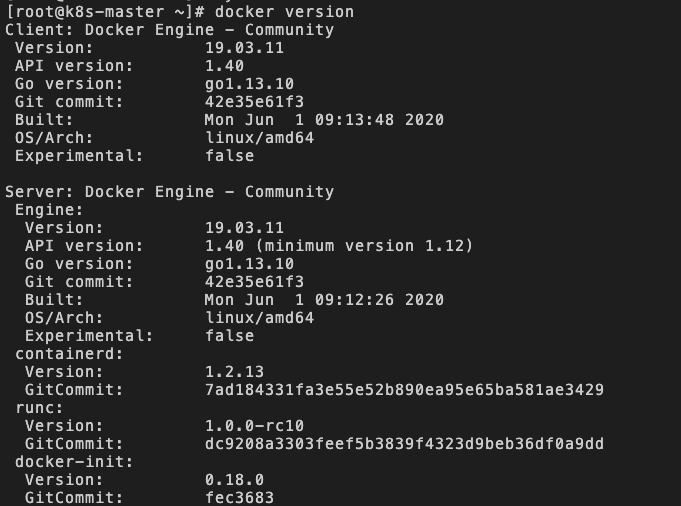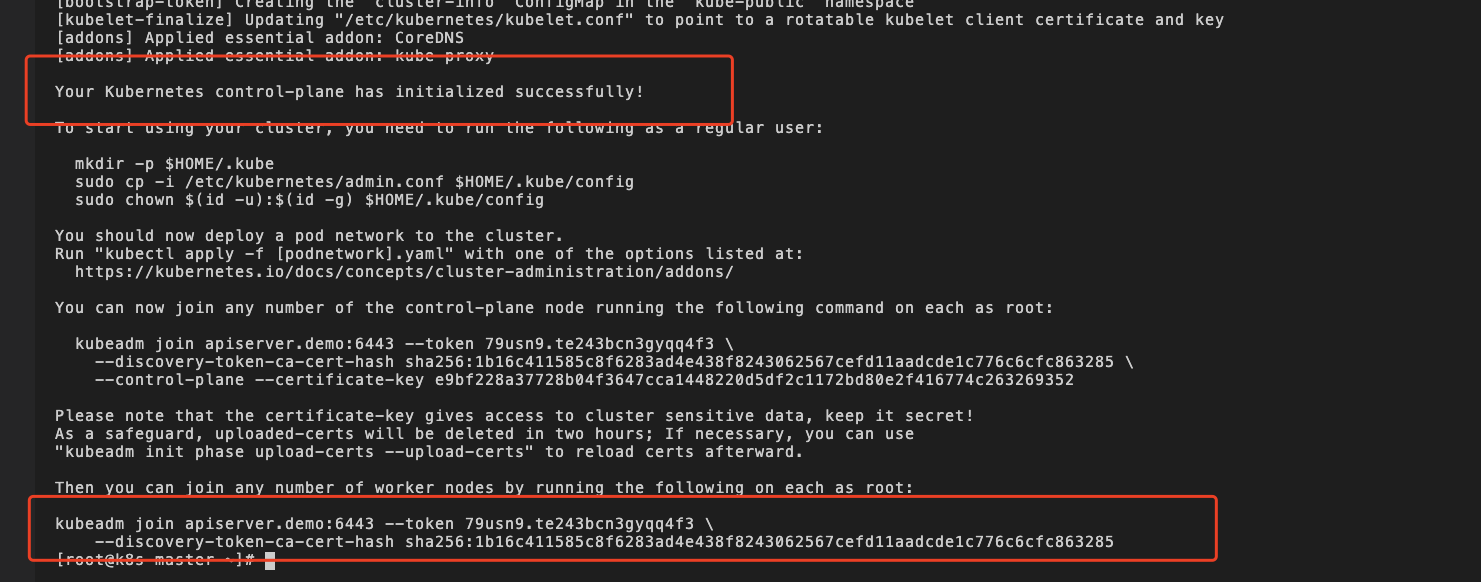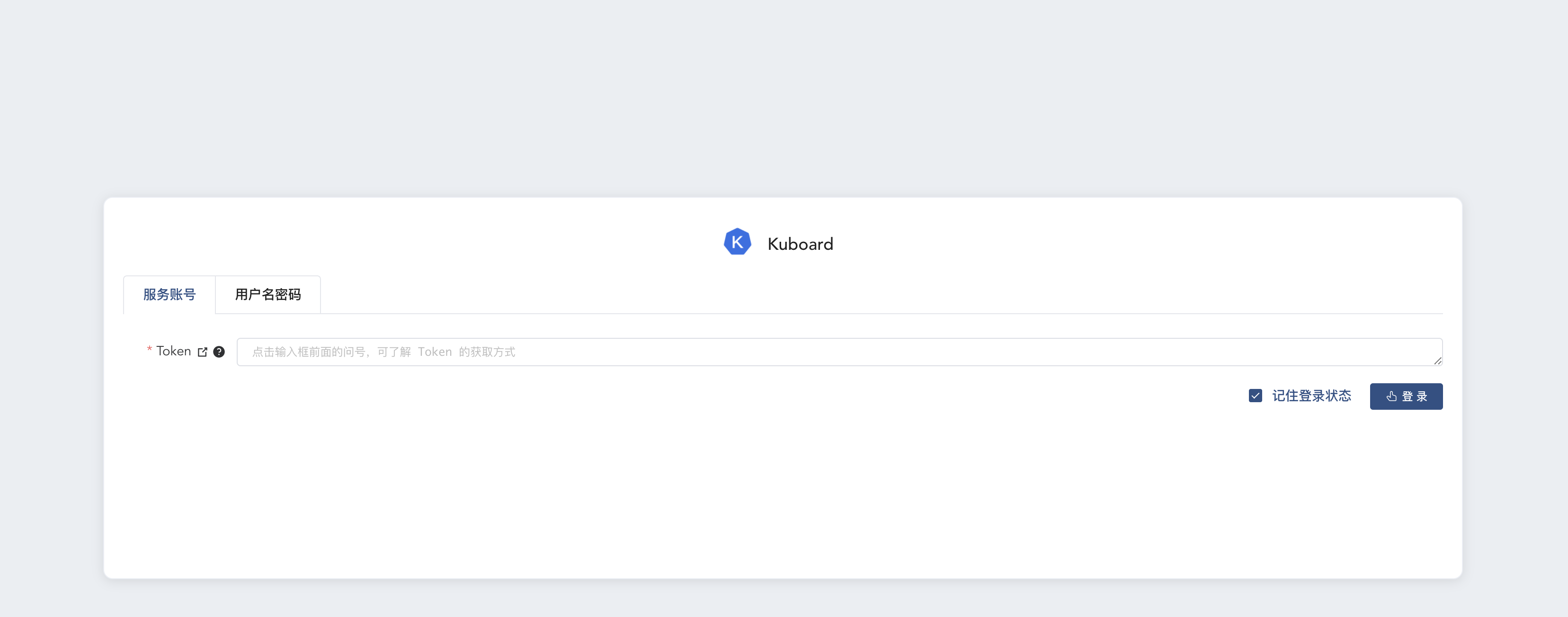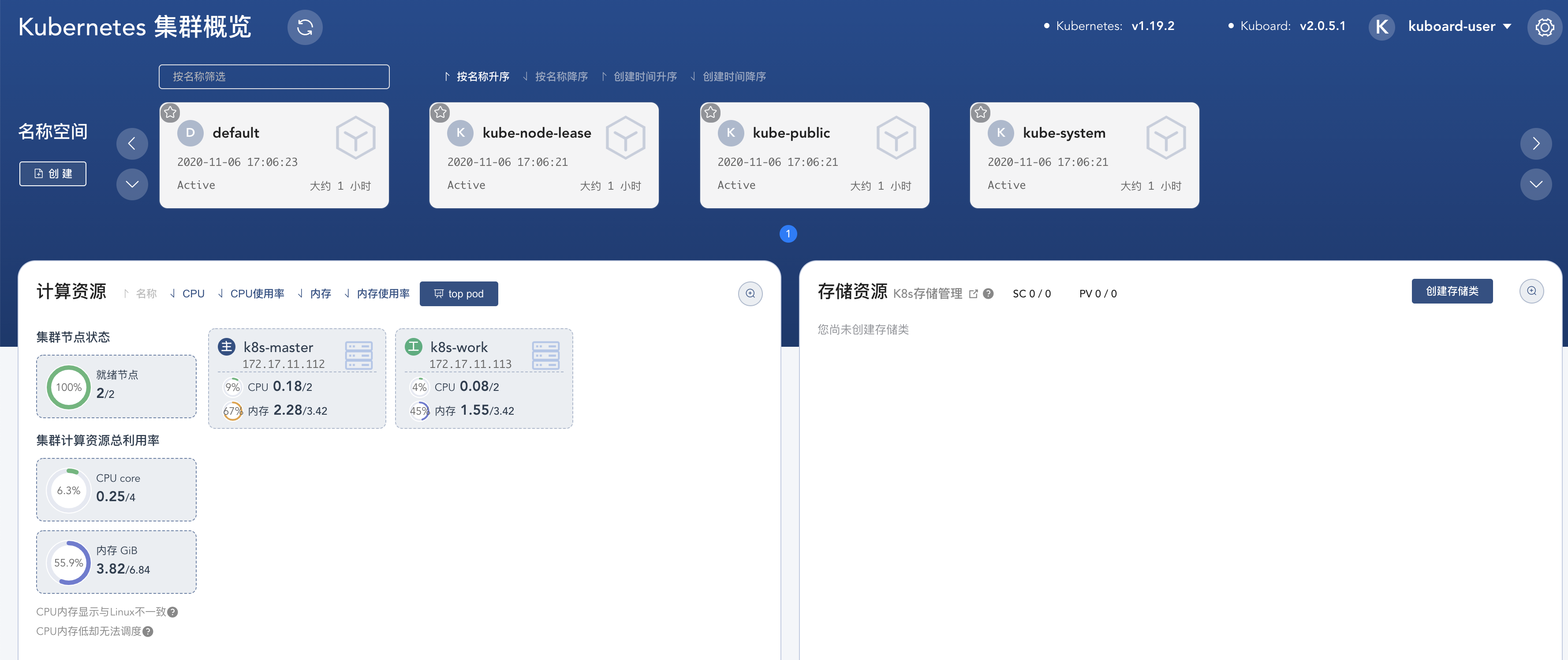环境准备:
至少2台 2核4G 的服务器Cent OS 7.6 / 7.7 / 7.8
master:172.17.11.112(内网)
work: 172.17.11.113(内网)
说明:所有节点上 Kubernetes 所使用的 IP 地址必须可以互通(无需 NAT 映射、无安全组或防火墙隔离)
开始安装
1、修改 hostname
# 修改 hostname
hostnamectl set-hostname your-new-host-name
# 查看修改结果
hostnamectl status
# 设置 hostname 解析
echo "127.0.0.1 $(hostname)" >> /etc/hosts
master:

work:

2、安装docker及kubelet (master和work都执行)
1)设置源
# 阿里云 docker hub 镜像
export REGISTRY_MIRROR=https://registry.cn-hangzhou.aliyuncs.com
2)卸载旧版都docker
yum remove -y docker \
docker-client \
docker-client-latest \
docker-ce-cli \
docker-common \
docker-latest \
docker-latest-logrotate \
docker-logrotate \
docker-selinux \
docker-engine-selinux \
docker-engine
3)设置 yum repository
yum install -y yum-utils \
device-mapper-persistent-data \
lvm2
yum-config-manager --add-repo http://mirrors.aliyun.com/docker-ce/linux/centos/docker-ce.repo
4) 安装并启动 docker
yum install -y docker-ce-19.03.11 docker-ce-cli-19.03.11 containerd.io-1.2.13
mkdir /etc/docker || true
cat > /etc/docker/daemon.json <<EOF
{
"registry-mirrors": ["${REGISTRY_MIRROR}"],
"exec-opts": ["native.cgroupdriver=systemd"],
"log-driver": "json-file",
"log-opts": {
"max-size": "100m"
},
"storage-driver": "overlay2",
"storage-opts": [
"overlay2.override_kernel_check=true"
]
}
EOF
mkdir -p /etc/systemd/system/docker.service.d
# Restart Docker
systemctl daemon-reload
systemctl enable docker
systemctl restart docker

5)安装 nfs-utils
# 必须先安装 nfs-utils 才能挂载 nfs 网络存储
yum install -y nfs-utils
yum install -y wget
6)关闭 防火墙、SeLinux、swap
# 关闭 防火墙
systemctl stop firewalld
systemctl disable firewalld
# 关闭 SeLinux
setenforce 0
sed -i "s/SELINUX=enforcing/SELINUX=disabled/g" /etc/selinux/config
# 关闭 swap
swapoff -a
yes | cp /etc/fstab /etc/fstab_bak
cat /etc/fstab_bak |grep -v swap > /etc/fstab
7)修改 /etc/sysctl.conf
# 如果有配置,则修改
sed -i "s#^net.ipv4.ip_forward.*#net.ipv4.ip_forward=1#g" /etc/sysctl.conf
sed -i "s#^net.bridge.bridge-nf-call-ip6tables.*#net.bridge.bridge-nf-call-ip6tables=1#g" /etc/sysctl.conf
sed -i "s#^net.bridge.bridge-nf-call-iptables.*#net.bridge.bridge-nf-call-iptables=1#g" /etc/sysctl.conf
sed -i "s#^net.ipv6.conf.all.disable_ipv6.*#net.ipv6.conf.all.disable_ipv6=1#g" /etc/sysctl.conf
sed -i "s#^net.ipv6.conf.default.disable_ipv6.*#net.ipv6.conf.default.disable_ipv6=1#g" /etc/sysctl.conf
sed -i "s#^net.ipv6.conf.lo.disable_ipv6.*#net.ipv6.conf.lo.disable_ipv6=1#g" /etc/sysctl.conf
sed -i "s#^net.ipv6.conf.all.forwarding.*#net.ipv6.conf.all.forwarding=1#g" /etc/sysctl.conf
# 可能没有,追加
echo "net.ipv4.ip_forward = 1" >> /etc/sysctl.conf
echo "net.bridge.bridge-nf-call-ip6tables = 1" >> /etc/sysctl.conf
echo "net.bridge.bridge-nf-call-iptables = 1" >> /etc/sysctl.conf
echo "net.ipv6.conf.all.disable_ipv6 = 1" >> /etc/sysctl.conf
echo "net.ipv6.conf.default.disable_ipv6 = 1" >> /etc/sysctl.conf
echo "net.ipv6.conf.lo.disable_ipv6 = 1" >> /etc/sysctl.conf
echo "net.ipv6.conf.all.forwarding = 1" >> /etc/sysctl.conf
# 执行命令以应用
sysctl -p
8) 配置K8S的yum源
cat <<EOF > /etc/yum.repos.d/kubernetes.repo
[kubernetes]
name=Kubernetes
baseurl=http://mirrors.aliyun.com/kubernetes/yum/repos/kubernetes-el7-x86_64
enabled=1
gpgcheck=0
repo_gpgcheck=0
gpgkey=http://mirrors.aliyun.com/kubernetes/yum/doc/yum-key.gpg
http://mirrors.aliyun.com/kubernetes/yum/doc/rpm-package-key.gpg
EOF
9)安装kubelet、kubeadm、kubectl
# 卸载旧版本
yum remove -y kubelet kubeadm kubectl
# 安装kubelet、kubeadm、kubectl
yum install -y kubelet-1.19.2 kubeadm-1.19.2 kubectl-1.19.2
10)重启 docker,并启动 kubelet
systemctl daemon-reload
systemctl restart docker
systemctl enable kubelet && systemctl start kubelet
3、初始化 master 节点 (只在master)
关于初始化时用到的环境变量
- APISERVER_NAME 不能是 master 的 hostname
- APISERVER_NAME 必须全为小写字母、数字、小数点,不能包含减号
- POD_SUBNET 所使用的网段不能与 master节点/worker节点 所在的网段重叠。该字段的取值为一个 CIDR 值,如果您对 CIDR 这个概念还不熟悉,请仍然执行 export POD_SUBNET=10.100.0.1/16 命令,不做修改
1)环境变量
# 只在 master 节点执行
# export 命令只在当前 shell 会话中有效,开启新的 shell 窗口后,如果要继续安装过程,请重新执行此处的 export 命令
export MASTER_IP=172.17.11.112 #master 节点的内网IP
# 替换 apiserver.demo 为 您想要的 dnsName
export APISERVER_NAME=apiserver.demo
# Kubernetes 容器组所在的网段,该网段安装完成后,由 kubernetes 创建,事先并不存在于您的物理网络中
export POD_SUBNET=10.100.0.1/16
echo "${MASTER_IP} ${APISERVER_NAME}" >> /etc/hosts
2)生成初始化文件
cat <<EOF > ./kubeadm-config.yaml
apiVersion: kubeadm.k8s.io/v1beta2
kind: ClusterConfiguration
kubernetesVersion: v1.19.2
imageRepository: registry.aliyuncs.com/k8sxio
controlPlaneEndpoint: "${APISERVER_NAME}:6443"
networking:
serviceSubnet: "10.96.0.0/16"
podSubnet: "${POD_SUBNET}"
dnsDomain: "cluster.local"
EOF
3)kubeadm init
kubeadm init --config=kubeadm-config.yaml --upload-certs

4)配置 kubectl
rm -rf /root/.kube/
mkdir /root/.kube/
cp -i /etc/kubernetes/admin.conf /root/.kube/config
5)安装 calico 网络插件
rm -f calico-3.13.1.yaml
wget https://kuboard.cn/install-script/calico/calico-3.13.1.yaml
kubectl apply -f calico-3.13.1.yaml
calico-3.13.1.yaml:
---
# Source: calico/templates/calico-config.yaml
# This ConfigMap is used to configure a self-hosted Calico installation.
kind: ConfigMap
apiVersion: v1
metadata:
name: calico-config
namespace: kube-system
data:
# Typha is disabled.
typha_service_name: "none"
# Configure the backend to use.
calico_backend: "bird"
# Configure the MTU to use
veth_mtu: "1440"
# The CNI network configuration to install on each node. The special
# values in this config will be automatically populated.
cni_network_config: |-
{
"name": "k8s-pod-network",
"cniVersion": "0.3.1",
"plugins": [
{
"type": "calico",
"log_level": "info",
"datastore_type": "kubernetes",
"nodename": "__KUBERNETES_NODE_NAME__",
"mtu": __CNI_MTU__,
"ipam": {
"type": "calico-ipam"
},
"policy": {
"type": "k8s"
},
"kubernetes": {
"kubeconfig": "__KUBECONFIG_FILEPATH__"
}
},
{
"type": "portmap",
"snat": true,
"capabilities": {"portMappings": true}
},
{
"type": "bandwidth",
"capabilities": {"bandwidth": true}
}
]
}
---
# Source: calico/templates/kdd-crds.yaml
apiVersion: apiextensions.k8s.io/v1beta1
kind: CustomResourceDefinition
metadata:
name: bgpconfigurations.crd.projectcalico.org
spec:
scope: Cluster
group: crd.projectcalico.org
version: v1
names:
kind: BGPConfiguration
plural: bgpconfigurations
singular: bgpconfiguration
---
apiVersion: apiextensions.k8s.io/v1beta1
kind: CustomResourceDefinition
metadata:
name: bgppeers.crd.projectcalico.org
spec:
scope: Cluster
group: crd.projectcalico.org
version: v1
names:
kind: BGPPeer
plural: bgppeers
singular: bgppeer
---
apiVersion: apiextensions.k8s.io/v1beta1
kind: CustomResourceDefinition
metadata:
name: blockaffinities.crd.projectcalico.org
spec:
scope: Cluster
group: crd.projectcalico.org
version: v1
names:
kind: BlockAffinity
plural: blockaffinities
singular: blockaffinity
---
apiVersion: apiextensions.k8s.io/v1beta1
kind: CustomResourceDefinition
metadata:
name: clusterinformations.crd.projectcalico.org
spec:
scope: Cluster
group: crd.projectcalico.org
version: v1
names:
kind: ClusterInformation
plural: clusterinformations
singular: clusterinformation
---
apiVersion: apiextensions.k8s.io/v1beta1
kind: CustomResourceDefinition
metadata:
name: felixconfigurations.crd.projectcalico.org
spec:
scope: Cluster
group: crd.projectcalico.org
version: v1
names:
kind: FelixConfiguration
plural: felixconfigurations
singular: felixconfiguration
---
apiVersion: apiextensions.k8s.io/v1beta1
kind: CustomResourceDefinition
metadata:
name: globalnetworkpolicies.crd.projectcalico.org
spec:
scope: Cluster
group: crd.projectcalico.org
version: v1
names:
kind: GlobalNetworkPolicy
plural: globalnetworkpolicies
singular: globalnetworkpolicy
---
apiVersion: apiextensions.k8s.io/v1beta1
kind: CustomResourceDefinition
metadata:
name: globalnetworksets.crd.projectcalico.org
spec:
scope: Cluster
group: crd.projectcalico.org
version: v1
names:
kind: GlobalNetworkSet
plural: globalnetworksets
singular: globalnetworkset
---
apiVersion: apiextensions.k8s.io/v1beta1
kind: CustomResourceDefinition
metadata:
name: hostendpoints.crd.projectcalico.org
spec:
scope: Cluster
group: crd.projectcalico.org
version: v1
names:
kind: HostEndpoint
plural: hostendpoints
singular: hostendpoint
---
apiVersion: apiextensions.k8s.io/v1beta1
kind: CustomResourceDefinition
metadata:
name: ipamblocks.crd.projectcalico.org
spec:
scope: Cluster
group: crd.projectcalico.org
version: v1
names:
kind: IPAMBlock
plural: ipamblocks
singular: ipamblock
---
apiVersion: apiextensions.k8s.io/v1beta1
kind: CustomResourceDefinition
metadata:
name: ipamconfigs.crd.projectcalico.org
spec:
scope: Cluster
group: crd.projectcalico.org
version: v1
names:
kind: IPAMConfig
plural: ipamconfigs
singular: ipamconfig
---
apiVersion: apiextensions.k8s.io/v1beta1
kind: CustomResourceDefinition
metadata:
name: ipamhandles.crd.projectcalico.org
spec:
scope: Cluster
group: crd.projectcalico.org
version: v1
names:
kind: IPAMHandle
plural: ipamhandles
singular: ipamhandle
---
apiVersion: apiextensions.k8s.io/v1beta1
kind: CustomResourceDefinition
metadata:
name: ippools.crd.projectcalico.org
spec:
scope: Cluster
group: crd.projectcalico.org
version: v1
names:
kind: IPPool
plural: ippools
singular: ippool
---
apiVersion: apiextensions.k8s.io/v1beta1
kind: CustomResourceDefinition
metadata:
name: networkpolicies.crd.projectcalico.org
spec:
scope: Namespaced
group: crd.projectcalico.org
version: v1
names:
kind: NetworkPolicy
plural: networkpolicies
singular: networkpolicy
---
apiVersion: apiextensions.k8s.io/v1beta1
kind: CustomResourceDefinition
metadata:
name: networksets.crd.projectcalico.org
spec:
scope: Namespaced
group: crd.projectcalico.org
version: v1
names:
kind: NetworkSet
plural: networksets
singular: networkset
---
---
# Source: calico/templates/rbac.yaml
# Include a clusterrole for the kube-controllers component,
# and bind it to the calico-kube-controllers serviceaccount.
kind: ClusterRole
apiVersion: rbac.authorization.k8s.io/v1
metadata:
name: calico-kube-controllers
rules:
# Nodes are watched to monitor for deletions.
- apiGroups: [""]
resources:
- nodes
verbs:
- watch
- list
- get
# Pods are queried to check for existence.
- apiGroups: [""]
resources:
- pods
verbs:
- get
# IPAM resources are manipulated when nodes are deleted.
- apiGroups: ["crd.projectcalico.org"]
resources:
- ippools
verbs:
- list
- apiGroups: ["crd.projectcalico.org"]
resources:
- blockaffinities
- ipamblocks
- ipamhandles
verbs:
- get
- list
- create
- update
- delete
# Needs access to update clusterinformations.
- apiGroups: ["crd.projectcalico.org"]
resources:
- clusterinformations
verbs:
- get
- create
- update
---
kind: ClusterRoleBinding
apiVersion: rbac.authorization.k8s.io/v1
metadata:
name: calico-kube-controllers
roleRef:
apiGroup: rbac.authorization.k8s.io
kind: ClusterRole
name: calico-kube-controllers
subjects:
- kind: ServiceAccount
name: calico-kube-controllers
namespace: kube-system
---
# Include a clusterrole for the calico-node DaemonSet,
# and bind it to the calico-node serviceaccount.
kind: ClusterRole
apiVersion: rbac.authorization.k8s.io/v1
metadata:
name: calico-node
rules:
# The CNI plugin needs to get pods, nodes, and namespaces.
- apiGroups: [""]
resources:
- pods
- nodes
- namespaces
verbs:
- get
- apiGroups: [""]
resources:
- endpoints
- services
verbs:
# Used to discover service IPs for advertisement.
- watch
- list
# Used to discover Typhas.
- get
# Pod CIDR auto-detection on kubeadm needs access to config maps.
- apiGroups: [""]
resources:
- configmaps
verbs:
- get
- apiGroups: [""]
resources:
- nodes/status
verbs:
# Needed for clearing NodeNetworkUnavailable flag.
- patch
# Calico stores some configuration information in node annotations.
- update
# Watch for changes to Kubernetes NetworkPolicies.
- apiGroups: ["networking.k8s.io"]
resources:
- networkpolicies
verbs:
- watch
- list
# Used by Calico for policy information.
- apiGroups: [""]
resources:
- pods
- namespaces
- serviceaccounts
verbs:
- list
- watch
# The CNI plugin patches pods/status.
- apiGroups: [""]
resources:
- pods/status
verbs:
- patch
# Calico monitors various CRDs for config.
- apiGroups: ["crd.projectcalico.org"]
resources:
- globalfelixconfigs
- felixconfigurations
- bgppeers
- globalbgpconfigs
- bgpconfigurations
- ippools
- ipamblocks
- globalnetworkpolicies
- globalnetworksets
- networkpolicies
- networksets
- clusterinformations
- hostendpoints
- blockaffinities
verbs:
- get
- list
- watch
# Calico must create and update some CRDs on startup.
- apiGroups: ["crd.projectcalico.org"]
resources:
- ippools
- felixconfigurations
- clusterinformations
verbs:
- create
- update
# Calico stores some configuration information on the node.
- apiGroups: [""]
resources:
- nodes
verbs:
- get
- list
- watch
# These permissions are only requried for upgrade from v2.6, and can
# be removed after upgrade or on fresh installations.
- apiGroups: ["crd.projectcalico.org"]
resources:
- bgpconfigurations
- bgppeers
verbs:
- create
- update
# These permissions are required for Calico CNI to perform IPAM allocations.
- apiGroups: ["crd.projectcalico.org"]
resources:
- blockaffinities
- ipamblocks
- ipamhandles
verbs:
- get
- list
- create
- update
- delete
- apiGroups: ["crd.projectcalico.org"]
resources:
- ipamconfigs
verbs:
- get
# Block affinities must also be watchable by confd for route aggregation.
- apiGroups: ["crd.projectcalico.org"]
resources:
- blockaffinities
verbs:
- watch
# The Calico IPAM migration needs to get daemonsets. These permissions can be
# removed if not upgrading from an installation using host-local IPAM.
- apiGroups: ["apps"]
resources:
- daemonsets
verbs:
- get
---
apiVersion: rbac.authorization.k8s.io/v1
kind: ClusterRoleBinding
metadata:
name: calico-node
roleRef:
apiGroup: rbac.authorization.k8s.io
kind: ClusterRole
name: calico-node
subjects:
- kind: ServiceAccount
name: calico-node
namespace: kube-system
---
# Source: calico/templates/calico-node.yaml
# This manifest installs the calico-node container, as well
# as the CNI plugins and network config on
# each master and worker node in a Kubernetes cluster.
kind: DaemonSet
apiVersion: apps/v1
metadata:
name: calico-node
namespace: kube-system
labels:
k8s-app: calico-node
spec:
selector:
matchLabels:
k8s-app: calico-node
updateStrategy:
type: RollingUpdate
rollingUpdate:
maxUnavailable: 1
template:
metadata:
labels:
k8s-app: calico-node
annotations:
# This, along with the CriticalAddonsOnly toleration below,
# marks the pod as a critical add-on, ensuring it gets
# priority scheduling and that its resources are reserved
# if it ever gets evicted.
scheduler.alpha.kubernetes.io/critical-pod: ''
spec:
nodeSelector:
kubernetes.io/os: linux
hostNetwork: true
tolerations:
# Make sure calico-node gets scheduled on all nodes.
- effect: NoSchedule
operator: Exists
# Mark the pod as a critical add-on for rescheduling.
- key: CriticalAddonsOnly
operator: Exists
- effect: NoExecute
operator: Exists
serviceAccountName: calico-node
# Minimize downtime during a rolling upgrade or deletion; tell Kubernetes to do a "force
# deletion": https://kubernetes.io/docs/concepts/workloads/pods/pod/#termination-of-pods.
terminationGracePeriodSeconds: 0
priorityClassName: system-node-critical
initContainers:
# This container performs upgrade from host-local IPAM to calico-ipam.
# It can be deleted if this is a fresh installation, or if you have already
# upgraded to use calico-ipam.
- name: upgrade-ipam
image: calico/cni:v3.13.1
command: ["/opt/cni/bin/calico-ipam", "-upgrade"]
env:
- name: KUBERNETES_NODE_NAME
valueFrom:
fieldRef:
fieldPath: spec.nodeName
- name: CALICO_NETWORKING_BACKEND
valueFrom:
configMapKeyRef:
name: calico-config
key: calico_backend
volumeMounts:
- mountPath: /var/lib/cni/networks
name: host-local-net-dir
- mountPath: /host/opt/cni/bin
name: cni-bin-dir
securityContext:
privileged: true
# This container installs the CNI binaries
# and CNI network config file on each node.
- name: install-cni
image: calico/cni:v3.13.1
command: ["/install-cni.sh"]
env:
# Name of the CNI config file to create.
- name: CNI_CONF_NAME
value: "10-calico.conflist"
# The CNI network config to install on each node.
- name: CNI_NETWORK_CONFIG
valueFrom:
configMapKeyRef:
name: calico-config
key: cni_network_config
# Set the hostname based on the k8s node name.
- name: KUBERNETES_NODE_NAME
valueFrom:
fieldRef:
fieldPath: spec.nodeName
# CNI MTU Config variable
- name: CNI_MTU
valueFrom:
configMapKeyRef:
name: calico-config
key: veth_mtu
# Prevents the container from sleeping forever.
- name: SLEEP
value: "false"
volumeMounts:
- mountPath: /host/opt/cni/bin
name: cni-bin-dir
- mountPath: /host/etc/cni/net.d
name: cni-net-dir
securityContext:
privileged: true
# Adds a Flex Volume Driver that creates a per-pod Unix Domain Socket to allow Dikastes
# to communicate with Felix over the Policy Sync API.
- name: flexvol-driver
image: calico/pod2daemon-flexvol:v3.13.1
volumeMounts:
- name: flexvol-driver-host
mountPath: /host/driver
securityContext:
privileged: true
containers:
# Runs calico-node container on each Kubernetes node. This
# container programs network policy and routes on each
# host.
- name: calico-node
image: calico/node:v3.13.1
env:
# Use Kubernetes API as the backing datastore.
- name: DATASTORE_TYPE
value: "kubernetes"
# Wait for the datastore.
- name: WAIT_FOR_DATASTORE
value: "true"
# Set based on the k8s node name.
- name: NODENAME
valueFrom:
fieldRef:
fieldPath: spec.nodeName
# Choose the backend to use.
- name: CALICO_NETWORKING_BACKEND
valueFrom:
configMapKeyRef:
name: calico-config
key: calico_backend
# Cluster type to identify the deployment type
- name: CLUSTER_TYPE
value: "k8s,bgp"
# Auto-detect the BGP IP address.
- name: IP
value: "autodetect"
# Enable IPIP
- name: CALICO_IPV4POOL_IPIP
value: "Always"
# Set MTU for tunnel device used if ipip is enabled
- name: FELIX_IPINIPMTU
valueFrom:
configMapKeyRef:
name: calico-config
key: veth_mtu
# The default IPv4 pool to create on startup if none exists. Pod IPs will be
# chosen from this range. Changing this value after installation will have
# no effect. This should fall within `--cluster-cidr`.
# - name: CALICO_IPV4POOL_CIDR
# value: "192.168.0.0/16"
# Disable file logging so `kubectl logs` works.
- name: CALICO_DISABLE_FILE_LOGGING
value: "true"
# Set Felix endpoint to host default action to ACCEPT.
- name: FELIX_DEFAULTENDPOINTTOHOSTACTION
value: "ACCEPT"
# Disable IPv6 on Kubernetes.
- name: FELIX_IPV6SUPPORT
value: "false"
# Set Felix logging to "info"
- name: FELIX_LOGSEVERITYSCREEN
value: "info"
- name: FELIX_HEALTHENABLED
value: "true"
securityContext:
privileged: true
resources:
requests:
cpu: 250m
livenessProbe:
exec:
command:
- /bin/calico-node
- -felix-live
- -bird-live
periodSeconds: 10
initialDelaySeconds: 10
failureThreshold: 6
readinessProbe:
exec:
command:
- /bin/calico-node
- -felix-ready
- -bird-ready
periodSeconds: 10
volumeMounts:
- mountPath: /lib/modules
name: lib-modules
readOnly: true
- mountPath: /run/xtables.lock
name: xtables-lock
readOnly: false
- mountPath: /var/run/calico
name: var-run-calico
readOnly: false
- mountPath: /var/lib/calico
name: var-lib-calico
readOnly: false
- name: policysync
mountPath: /var/run/nodeagent
volumes:
# Used by calico-node.
- name: lib-modules
hostPath:
path: /lib/modules
- name: var-run-calico
hostPath:
path: /var/run/calico
- name: var-lib-calico
hostPath:
path: /var/lib/calico
- name: xtables-lock
hostPath:
path: /run/xtables.lock
type: FileOrCreate
# Used to install CNI.
- name: cni-bin-dir
hostPath:
path: /opt/cni/bin
- name: cni-net-dir
hostPath:
path: /etc/cni/net.d
# Mount in the directory for host-local IPAM allocations. This is
# used when upgrading from host-local to calico-ipam, and can be removed
# if not using the upgrade-ipam init container.
- name: host-local-net-dir
hostPath:
path: /var/lib/cni/networks
# Used to create per-pod Unix Domain Sockets
- name: policysync
hostPath:
type: DirectoryOrCreate
path: /var/run/nodeagent
# Used to install Flex Volume Driver
- name: flexvol-driver-host
hostPath:
type: DirectoryOrCreate
path: /usr/libexec/kubernetes/kubelet-plugins/volume/exec/nodeagent~uds
---
apiVersion: v1
kind: ServiceAccount
metadata:
name: calico-node
namespace: kube-system
---
# Source: calico/templates/calico-kube-controllers.yaml
# See https://github.com/projectcalico/kube-controllers
apiVersion: apps/v1
kind: Deployment
metadata:
name: calico-kube-controllers
namespace: kube-system
labels:
k8s-app: calico-kube-controllers
spec:
# The controllers can only have a single active instance.
replicas: 1
selector:
matchLabels:
k8s-app: calico-kube-controllers
strategy:
type: Recreate
template:
metadata:
name: calico-kube-controllers
namespace: kube-system
labels:
k8s-app: calico-kube-controllers
annotations:
scheduler.alpha.kubernetes.io/critical-pod: ''
spec:
nodeSelector:
kubernetes.io/os: linux
tolerations:
# Mark the pod as a critical add-on for rescheduling.
- key: CriticalAddonsOnly
operator: Exists
- key: node-role.kubernetes.io/master
effect: NoSchedule
serviceAccountName: calico-kube-controllers
priorityClassName: system-cluster-critical
containers:
- name: calico-kube-controllers
image: calico/kube-controllers:v3.13.1
env:
# Choose which controllers to run.
- name: ENABLED_CONTROLLERS
value: node
- name: DATASTORE_TYPE
value: kubernetes
readinessProbe:
exec:
command:
- /usr/bin/check-status
- -r
---
apiVersion: v1
kind: ServiceAccount
metadata:
name: calico-kube-controllers
namespace: kube-system
---
# Source: calico/templates/calico-etcd-secrets.yaml
---
# Source: calico/templates/calico-typha.yaml
---
# Source: calico/templates/configure-canal.yaml
6)检查 master 初始化结果
# 只在 master 节点执行
# 执行如下命令,等待 3-10 分钟,直到所有的容器组处于 Running 状态
watch kubectl get pod -n kube-system -o wide
# 查看 master 节点初始化结果
kubectl get nodes -o wide


至此,k8s的master节点就部署好了。
4、初始化 worker节点
1)在 master 节点上执行
# 只在 master 节点执行
kubeadm token create --print-join-command
可获取kubeadm join 命令及参数,如下所示

2)初始化worker
vim /etc/hosts
172.17.11.112 apiserver.demo
# 只在 worker 节点执行
export MASTER_IP=172.17.11.112 #master 节点的内网 IP
# 替换 apiserver.demo 为初始化 master 节点时所使用的 APISERVER_NAME
export APISERVER_NAME=apiserver.demo
echo "${MASTER_IP} ${APISERVER_NAME}" >> /etc/hosts
# 替换为 master 节点上 kubeadm token create 命令的输出

3)检查初始化结果
# 只在 master 节点执行
kubectl get nodes -o wide

您已经完成了 Kubernetes 集群的安装.
5、安装 Kubernetes 管理工具
kubectl apply -f https://kuboard.cn/install-script/kuboard.yaml
kubectl apply -f https://addons.kuboard.cn/metrics-server/0.3.7/metrics-server.yaml
查看 Kuboard 运行状态:
kubectl get pods -l k8s.kuboard.cn/name=kuboard -n kube-system

获取Token
# 如果您参考 www.kuboard.cn 提供的文档安装 Kuberenetes,可在第一个 Master 节点上执行此命令
echo $(kubectl -n kube-system get secret $(kubectl -n kube-system get secret | grep kuboard-user | awk '{print $1}') -o go-template='{{.data.token}}' | base64 -d)
访问Kuboard
使用了 NodePort 的方式暴露服务,NodePort 为 32567;您可以按如下方式访问 Kuboard。
http://任意一个Worker节点的IP地址:32567/
输入前一步骤中获得的 token,可进入 Kuboard 集群概览页




评论区